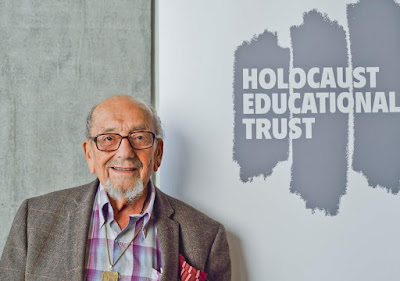Harry was born in Vienna on 26 December 1925. He lived with his parents, Michael and Esther, and sister Gertie. By all accounts, Harry had a happy childhood in the Austrian capital, enjoying activities such as ice-skating, but that all changed with the Anschluss of Austria by the Nazis in 1938. Suddenly, Harry's non-Jewish friends refused to talk to him; shortly aftewards, he was forced out of his mixed school and had to attend a basic school for only Jewish children.
The Bibring's situation worsened dramatically with Kristallnacht, a night of violence and terror in November 1938 against the Jewish population of Germany and Austria. During the night, Michael's menswear shop was ransacked, and he was arrested. The rest of the Bibring family were forced into a house with 50 other Jewish women and children until his release. It was at this point the family realised they would no longer be safe in Vienna.
Harry and Gertie were put on a Kindertransport leaving for Britain. They never saw their parents again. Michael died of a heart attack in November 1940, whilst Esther was murdered at the death camp in Sobibór (then part of German-occupied Poland) in 1942.
Despite this heartbreak, Harry grew up and created a life for himself in the UK. He married, had children (and, eventually, grandchildren and great-grandchildren) and established a career as an engineer. After his retirement, Harry spent two decades sharing his story with groups all over Britain, committed to ensuring education and awareness of the Holocaust remained prominent in society. He received the British Empire Medal in 2018 for this service. Aged 93, he spoke at a school just a day before his death. Survivors of the Holocaust are nothing if not resilient.
I did not know Harry well, but his was a very familiar face at almost every Holocaust Educational Trust event I attended over the last 10 years. He had a quiet dignity about him. He was softly spoken but always very keen to talk to young people who were interested in the Trust's work. I will always remember the large, golden medallion with a chai Harry wore around his neck, so proud of the Jewish identity that the Nazis could never take from him.
Just over a week before his death, Harry Bibring attended a burial ceremony at Bushey New Cemetery, where the remains of six anonymous Jewish victims of Auschwitz were laid to rest. Wrapped up warmly, cane in hand, he escorted the coffin to the grave, alongside a number of other elderly survivors. Speaking to the Jewish Chronicle after the ceremony, Harry said:
"[The ceremony was] out of this world – the most moving day of all time. It means to me that I have now buried my mother and my father, which I have never been able to do, 70 years late."
It seems, just a short time before his own death, Harry Bibring was able to gain a little closure on the tragic events of his own past.May his memory be a blessing.


